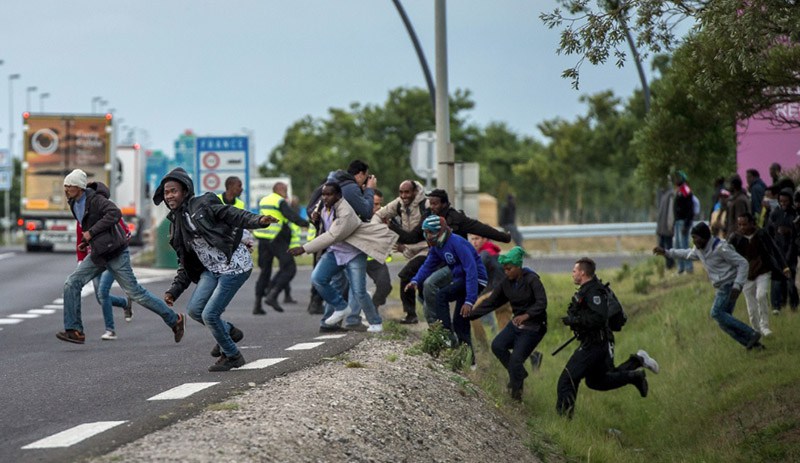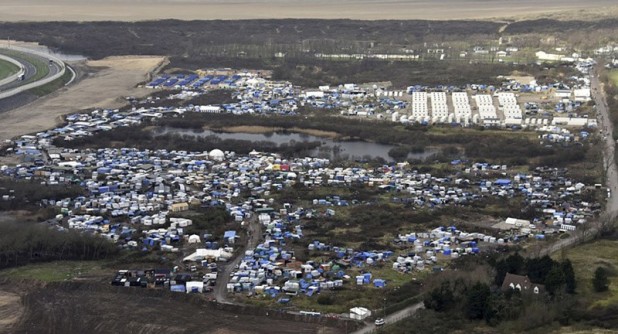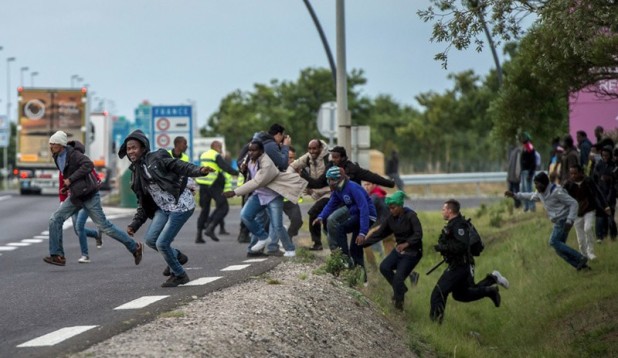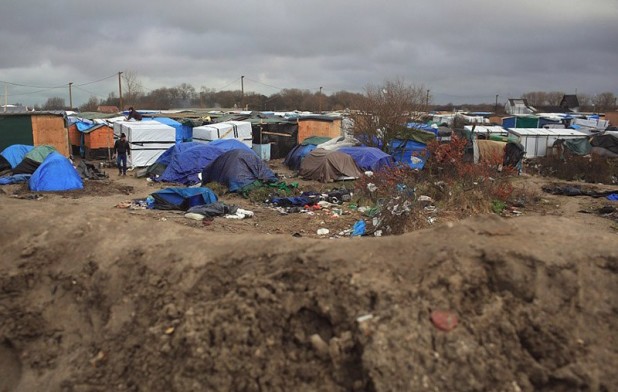The New Observer
February 11, 2016
Last weekend, the former French Legion commander General Christian Piquemal was arrested by French police during an anti-invasion rally in Calais, France. Now, an ordinary resident of that town breaks the controlled media blackout of that rally, and what life is really like for people in Calais since the nonwhite invasion started.
Below is a video of Calais resident Simone Héricourt’s account of the situation in Calais, given on Sunday, February 7, 2016 in Rungis in front of a patriotic audience. A full English transcript follows underneath.
https://www.youtube.com/watch?v=UKAQX74yRyc
Well, here we are. Pierre introduced me. My name is Simone and I live in Calais. I am of Calaisian stock. My parents lived in Calais. Calais is my life. It’s where I grew up and I’ve always lived there.
Calais used to be a very pleasant town. I used to love going on walks. We had tranquility and safety. There were always a lot of visitors, both in the summer and in the winter, even though God knows our summers are never that pleasant; the weather is never great here. But the place was alive.
Some time ago refugees came to Sangatte. Sarkozy decided to shut down their squatting zone there, and the refugees arrived in Calais. At first, even I considered them unfortunate people, deprived of means and ill-informed, whom we could perhaps give some help.
And I couldn’t tell you how it happened, but from one day to the next, we had thousands, thousands of migrants. Currently they number at 18,000 in what is called the Jungle. 18,000. It is horrible. They’ve downright made a city within the city. They’ve got a discotheque, businesses, schools, hairdressers… They even have… [pause] — I wouldn’t allow myself to say this, but I think you understand it concerns the needs of men. Of course.
They’ve made streets. They’ve given names to these streets. They elected a mayor. [Audience expresses shock] Yes! The police cannot at all enter what they call the “Muslim neighborhood.” It’s forbidden.
Up to that point, we perhaps might have been able to endure this. But we can’t endure the unendurable, when we see riots taking place during the night, every day, constantly.
They turn up in the center of the town, numbering 2,000, 3,000, 4,000, all over the place. They smash cars with iron bars. They assault people; they even assault children. They rob and they rape. What we endure is unimaginable.
They enter the homes of people, while people are at the dinner table, because they want to eat. They take what they want; sometimes they beat up the inhabitants. They steal what they want and smash what they can’t get. And when you defend yourself, the police get on your back [Audience expresses dismay].
For a long time now the police refuse to register complaints. My own son got assaulted. He was out on a walk in the town center, listening to music on headphones. Someone tapped his shoulder and he turned around, thinking it would be a friend.
Three “clandos” were facing him — excuse me, clandestines. He got hit on the head with an iron bar. My son is quite tough and managed to defend himself. So they got beat up.
But then he heard noise on his side: thirty migrants were now going after him. Being bold but not suicidal, he fled. When I saw my son return home my thought was that they could have killed him.
He isn’t alone. They assault kids on their way home from school, or on their way to school, to middle-school. They go so far as to get on school buses, with the kids.
On January 23rd, they did a big riot in Calais. It was horrible. It lasted the whole afternoon and the whole evening. They went so far as to tag the statue of General De Gaulle. They wrote “Nik la France” on it [“Fuk France”, sic], with the ISIS flag underneath.
What else can I tell you about what we endure? They demonstrate to protest the standards of the welcome they have received. But the more you give to them, the more they ask for. It’s never enough. Never, never.
When we cross their paths, it’s always “give money”, “give phone.” And if you don’t give, you get beaten up. And don’t count on the police to help you. As I said, they don’t even register complaints anymore.
When we want to demonstrate, the police get on our backs. When we get assaulted, they tell us at the police station: “What do you want us to say; they all look alike. There’s nothing we can do.” I promise that what I’m telling you is the truth.
I used to love going to visit what I call my son’s tomb: the sea. I lost my son and we dispersed his ashes into the sea, in accordance with his wish.
One evening I asked my husband to take me to my son’s tomb, because I needed it. This is something I can’t do anymore. Merely crossing the town center of Calais during the evening means exposing yourself to danger.
As soon as it starts getting dark, it gets dangerous. I can’t go where I used to like to go anymore. It’s not possible anymore. I’m scared. And there are many of us like this in Calais.
What I also don’t understand is the attitude of the Calaisians. Yesterday again there was a demonstration. There were perhaps ten people from Calais participating. Where were all the others? Fear does not steer us clear from danger. The Government has abandoned us. They’ve decided to doom Calais. If we from Calais don’t react to this, all the migrants in France will end up gathered here, and we’ll be done for; we’ll be dead. The Calaisians are like sheep. I don’t understand them.
Yesterday I participated in this demonstration. I was in the middle of it, with my husband, with my son, with friends. General Piquemal was there [Long round of applause].
After what I witnessed yesterday, I could not sleep, because I kept reviewing those scenes in my mind. The television, radio, and newspapers haven’t said what happened there. We saw him get arrested and mistreated like a racaille [street thug].
The man is a French icon; he deserves the respect owed to his rank, and he got treated like a racaille. They manhandled him to the ground and a policeman placed his boot on his neck.
We saw it happen; I promise as I stand before you. Then they picked him up and dragged him; his feet weren’t even touching the ground. And then they charged us of course.
I was lucky, because my husband, in a clever move, took us behind the vans and the water guns of the CRS [riot police]. Otherwise they would have detained us and I’d still be in jail today.
And what offense did I commit? I had come there. I had come to protest the massive and invasive immigration we are subjected to.
Do you realize that local shops have lost between 40 percent and 60 percent of their business? Before this, Calais used to be thriving, lively, gay. Foreigners would always come during the summer vacation time, and during the end of the year festivities. Today, nothing is left of that. Nothing.
The shops in the town center have shut down, one after the other. Calais is a dead city, because of the clandestines we have there. When they descend upon the town armed with iron bars and even Molotov cocktails… Yes, they were caught fabricating those… I don’t understand why they don’t get punished for that.
Why do the police let them go so quickly, when they catch them? [Round of applause.] If we, the French, the Calaisians, step out of line, we immediately get detained and subjected to interrogation. We have no rights left.
Let’s also talk about Natacha Bouchard. [The audience boos.] I call her the snail, because she has gotten fatter and fatter since she became mayor. She has done nothing for the inhabitants of Calais.
She received millions of Euros of help destined to support the local economy. The first thing she did with that money was to build containers to house the migrants. And those containers did not even come from Calais, they came from Brittany.
The only jobs she created in Calais, and I know this through a friend who was offered such a job, were fifty long-term positions to clean up the migrants’ refuse in the Jungle. Those are the jobs offered by Madame Bouchard. She has banned me from her Facebook page, so I can’t leave comments there anymore. She doesn’t like me. The feeling is mutual. [Audience laughing.]
As Pierre said, I’m not an intellectual. I didn’t get a higher education. I lost my father at a young age and had to stop school early in order to help with the business.
But that doesn’t mean I’m an idiot. I see what’s going on and I know what I’m talking about. We live under it every day.
There’s been a new development recently: the No Border activists. They are the worst racaille on the face of the Earth. They are the ones inciting the clandestines to riot in Calais.
It’s even worse than that. They post themselves across the town and coordinate riots using walkie-talkies.
I’ve seen the CRS [riot police] give ground to the migrants. That made me weep. I felt this wasn’t normal. We’re at home. This is our country, our town. The migrants should have been the ones retreating, not the CRS.
Why are they demonstrating? They want 2000 Euros pocket money per month. [Hilarity among the audience.] I don’t have that, personally. They want a car, and also a house, naturally.
So let’s talk about housing. Madame Bouchard has expelled people in Calais from their homes because those were situated in the Dunes area, close to the Jungle.
Indeed this proximity meant that they were being robbed and beaten on a regular basis. So she expelled them, even though they were paying their rent.
I myself am being thrown out of my house next month. My house is being confiscated, even though we’ve always been honest people.
It would be too long to explain. A court decided to sell the house, even though we’ve done nothing wrong. My husband is suffering from cancer, but that doesn’t change anything.
The French must be crushed and thrown out, their property seized to make room for the racaille intent on colonizing us. [Round of applause.]
The racaille, we are being told, will be a source of cultural enrichment for us. But I wonder where their cultural wealth is. If what we need is to wreck, destroy, steal, and rape, and this is the short version, well then the French are quite able to do this on their own. You just needed to ask us. [Round of applause.]
I speak with my heart and my words. [Long round of applause.]
Hat tip to Deltakyklos for providing the video and transcript.



